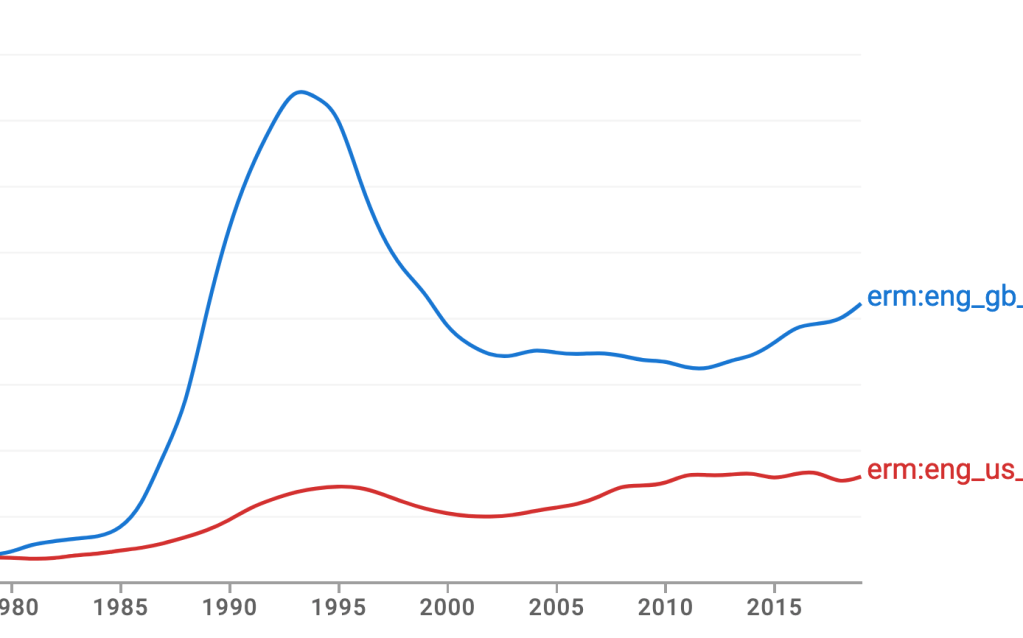In the very early days of this blog, I did a post on “erm,” which I took and still take to be the British version of the American “um,” with similar pronunciation. (That is, the “r” is silent, though on some occasions in the U.K. it’s pronounced more like “em.”) At that time, there was no entry for “erm” in the OED, so I constructed my own definition: “Interjection. Self-conscious vocalism, indicating skepticism.” The idea being that people said “erm” or “um” when they were hesitating, and that writers employed in attempting to cleverly call attention to what follows in the sentence. American speakers and writers had been doing the same thing with “um” but in the post I gave two recent U.S. “erm”s.
- “Here’s a report on the, erm, incident from CBC’s nightly national newscast.” (Slap Shot blog, New York Times, November 29, 2007)
- ”Justice Breyer asks a hypothetical question that he will pose several times today: ‘Imagine a well-educated American woman marries a man from a foreign country X. They have a divorce. The judge says the man is completely at fault here, a real rotter. The woman is 100 percent entitled to every possible bit of custody and the man can see the child twice a year on Christmas Day at 4:00 in the morning.’ (Erm. Isn’t that once a year?)” (Dahlia Lithwick, Slate, January 10, 2010)
In March 2023, the OED published an “erm” entry, with this definition: “Used to express uncertainty, embarrassment, a pause to consider one’s next words, etc., or as a conversational filler expressing hesitation or inarticulacy.” Interestingly, the citations, which ranged from 1911 to 2017, had no jokey written uses of “erm,” only lines of dialogue from works of fiction, or journalistic quotes, including this from The Dalesman in 2017: “The new vicar is visiting members of his Wensleydale parish. ‘Erm, could I just ask why you have a bucket of manure in your front room?’ asks the flustered man of the cloth.”
I had occasion to look this up because over the course of the week, I encountered two U.S. examples. The first was in the New York Times crossword puzzle:

And the second was in the captioning to the FX television series The Veil. (The character speaking isn’t British.)

Here’s what Google Books Ngram Viewer has to say about the use of the word in written sources in Britain and America:

Supporting the idea of a mild uptick in the U.S. is that fact that it’s been used four times in the past year in the New York Times, including:
- “… obsessing over who Donald Trump will pick as his new pain sponge — erm, running mate …”–Opinion columnist Michelle Cottle
- “Every generation, it seems, has a way of ‘discovering’ items of dress that previous generations dismissed in triumph, recontextualizing them and claiming them for its own, like anthropologists unearthing buried treasures. Wide ties? Bell bottoms? So ironically cool! Corsets? Neato! Waistcoats? Funky. Spats? Erm … maybe for a costume party.”–Fashion writer Vanessa Friedman
Such American uses are both cutesy and needlessly British, seeing as we’ve got our homegown “um.” So, erm, maybe give “erm” a rest?


The 2 examples given from the NYT are very deliberate uses of “erm” to draw attention to the dubious or humerous nature of what had just been written or said, similar to “cough, cough”. Conversely, inarticulate speakers will subconsciously insert “erm” or “um” into their speech to hold the conversation while they think of what next to say, blocking interruptions. Some Scots noticeably use “EMM”, seemingly at the end of every other phrase. It’s a sort of oral tic.
As a Brit I can confirm the erm. 🙂
I do so enjoy a good posh version of ‘Oi, ‘ang about!’ when needing to interject in a contrarian way.
Wait a minute, isn’t ‘erm’ what used to be described as ‘um’ (misheard through the mishmash of the many accents of British English? I think I’ve heard ‘um’ a lot, but ‘erm’—voiced as such? No. I can see that a non-RP speaker might misinterpret/hear an RP-speaker this way. But the underlying vocal hesitation is ‘um’. In my sixth decade I’ve never heard ‘erm’—at least vocalised as such. The difference doesn’t matter until/unless as here(?) it is used to misinterpret what is ‘trending’. My experience over decades of travel, is BrE and AmE speakers who have *not* travelled out of town much struggle with unusual-to-them sounds and misunderstand them regularly. We all—me too—mistake different accents of our first language but travel/exposure to foreign media helps.
Good afternoon, Ben!
Perhaps part of that small uptick is the result of your calling attention to the word. I think NOOB is better read than we might think. As an indicator of skepticism, I think “erm” does a better job than “um,” which can be ambiguous.
Or, perhaps it’s what Edwin Newman called “putting on the dog,” like adding a “ta” to words like “preventive” or deliberately pronouncing the “t” in “often.” Or these days, using the expression “begs the question” when all that was meant was “raises the question.” Sort of like “U” and “Non-U” in British speak.
I think “erm” and “um” can coexist as different onomatopoeic representations of sounds of hesitancy or disfluency, alongside “er”, and “mm”, and whatever else a writer can think of to represent such utterances
Adding a “ta” to “preventive” is not a matter of pronunciation; the word “preventative” is perfectly legitimate, has the same meaning and is almost as common in British English. As for not pronouncing the “t” in “often”, the posh pronunciation is the same as a child without any parents, ie. “orphan”.
Can anyone tell me why the New York Times crossword is stuffed with words that carry no meaning to me an Englishman. eg emits ills ots mrmom etc.
Well, EMITS and ILLS are standard English words, and MR MOM was a 1983 film. OTS is an abbreviation with many meanings.
Never tried a NY Times crosswords. I’m a UK cryptic person myself. (And many of the words in the Azed crossword in The Observer are very obscure,)
I agree completely with Ben that American usage of “erm” is scandalously unnecessary and unimaginative. Americans have plenty of equivalent words. Any American using “erm” is using it under the false assumption that it is interesting or cooler.
That said, Americans tend to use it to connote skepticism, while I believe British usage of the word to be more about place-holding. I signed up for an online presentation by the Economist a few years ago. One of the two speakers could not emit a single sentence without using “erm” at least once. Not a single sentence. It was too much for me that particular day, so I logged off, even though I was genuinely interested in the topic.